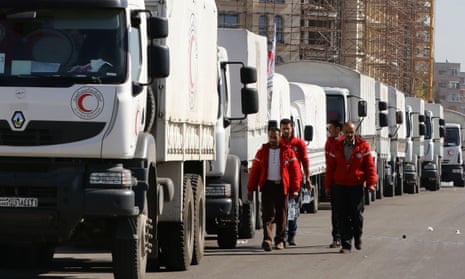Aid convoys loaded with food and medicine to relieve starving civilians have entered five besieged areas in Syria, the government of Bashar al-Assad has said.
The convoys, announced by the UN special envoy for Syria, Staffan de Mistura, on Tuesday night, entered the Damascus suburb of Moadamiyah, which is under siege from forces loyal to Assad, as well as Fua and Kefraya, which are besieged by rebels.
A further convoy has entered the city of Madaya, and another is en route to Zabadani. The citizens of both have been starving to death under a siege imposed by forces loyal to the regime.
Syrian officials said the Madaya convoy had departed from Damascus bearing food, medical supplies and other equipment, as well as a mobile clinic. Several residents in the town have died from malnutrition despite the arrival of an aid convoy last month. The dozens of aid trucks, containing wheat and high-energy foods, were provided by the Syrian Arab Red Crescent and the UN.
UN officials were also expected to meet on Wednesday to decide whether to airdrop supplies in Deir ez-Zor, where hundreds of thousands of people are under siege by Islamic State. The delivery of aid and supplies was agreed as part of a tentative and fragile deal struck last week in Munich for a “cessation of hostilities”. Unverified reports have suggested that up to 20 people in the city have died of starvation.
The fate of the convoys was called into question after the Syrian foreign ministry issued an angry rebuke to De Mistura’s statement, flexing its diplomatic muscle on the back of recent gains on the battlefield. The UN envoy said the provision of aid, part of an agreement reached by major powers in Munich last week, was a test of the Syrian government’s seriousness.
“The Syrian government does not allow neither UN special envoy for Syria, Staffan de Mistura, nor anybody else to talk about testing Syria’s seriousness in any matter,” the foreign ministry said. “Rather, the Syrian government is now in need to test the credibility of the UN special envoy, whose statements since the beginning of his mission to the mass media outlets, completely contradict to [sic] what happened in joint meetings with the Syrian government.”
“The Syrian Arab Republic, in this regard, reaffirms the government’s commitment to deliver humanitarian aid to the people living in areas besieged by terrorists, and this does not have any relation to Geneva, Munich or Vienna meetings, or any other party,” the statement said. “We don’t wait for anyone to remind us of our duties towards our people.”
The Syrian government refers to all opposition fighters as terrorists. Humanitarian agencies believe that more than a million people are living under siege in Syria in dozens of locations, the vast majority of which are sieges imposed by the regime.
Turkey said on Wednesday that it wanted to secure a strip of territory 10km (6 miles) deep on the Syrian side of its border, including the town of Azaz, to prevent attempts to “change the demographic structure” of the area, the deputy prime minister, Yalçın Akdoğan, said in an interview.
Syrian government forces backed by Russian airstrikes have advanced towards the Turkish border in a major offensive in recent weeks. Kurdish militia fighters, regarded by Ankara as hostile insurgents, have taken advantage of the violence to seize territory from Syrian rebels.
Turkey has accused the Kurdish fighters of forcibly displacing Turkmen and Arab communities. Ankara ultimately fears the creation of an independent Kurdish state occupying contiguous territories currently belonging to Iraq, Syria and Turkey.
